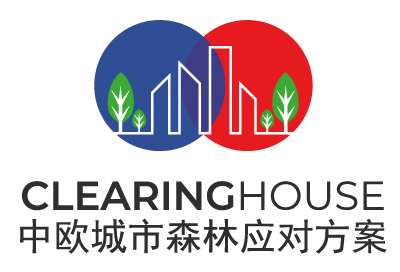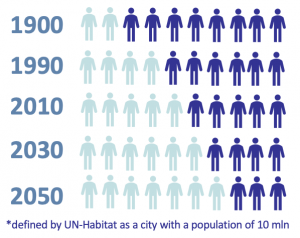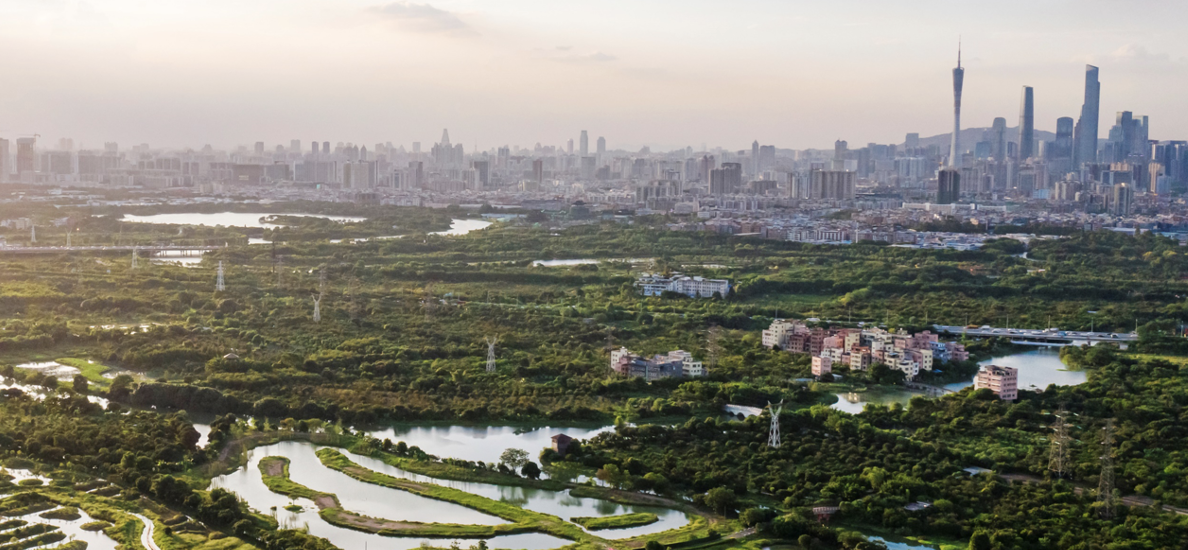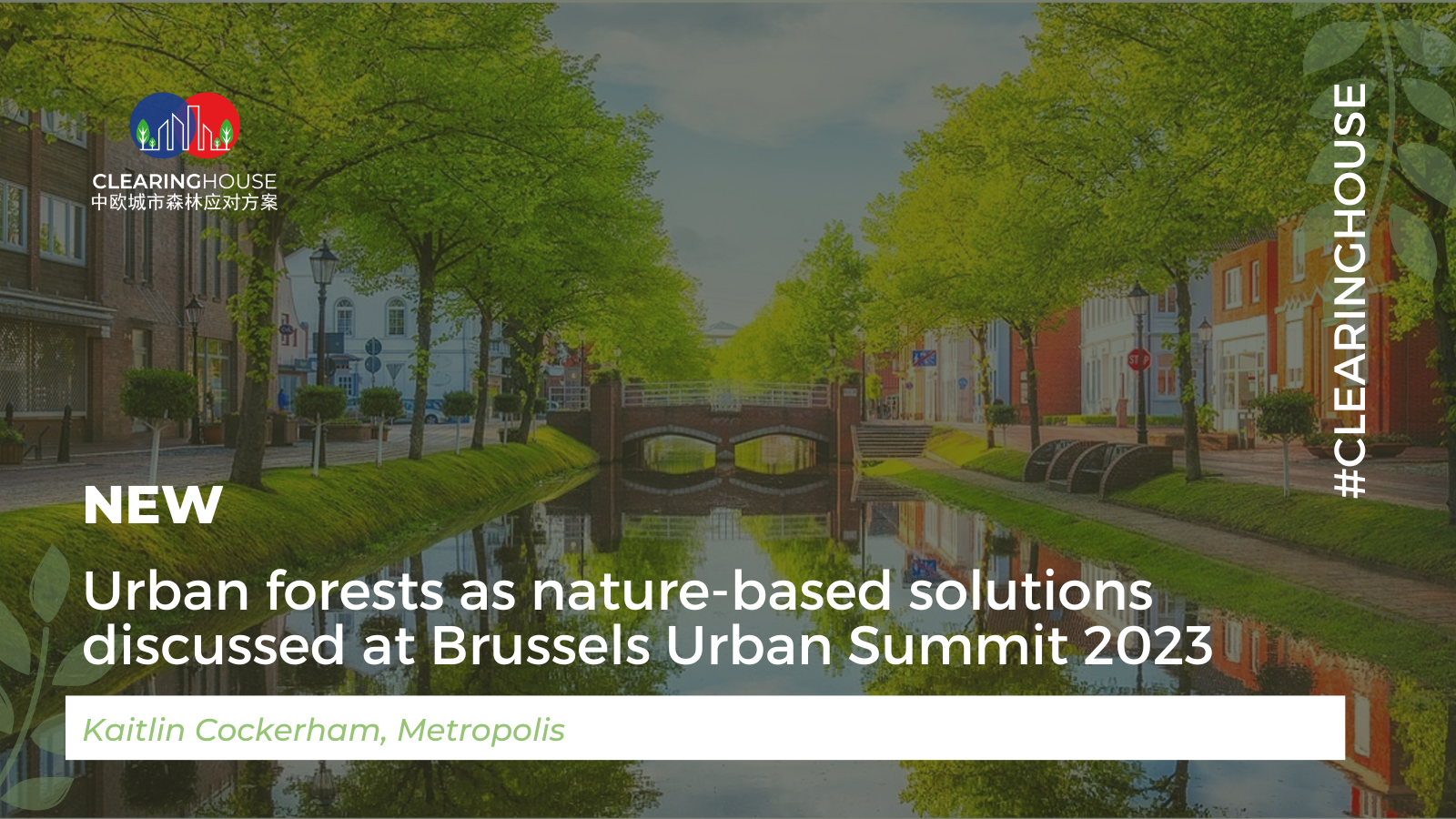
Urban forests as nature-based solutions discussed at Brussels Urban Summit 2023
As Susanna Gionfra, Senior Project Officer for Nature-based Solutions at the International Union for Conservation of Nature (IUCN) European Regional Office, so aptly put it while presenting at The Brussels Urban Summit in Brussels, Belgium, this June, “Cities are at the forefront of both the causes and impacts of major environmental challenges such as climate change, pollution and biodiversity loss.” Gionfra continued with a note that already “cities have large ecological footprints with 60 to 80% of the world’s energy consumption and 75% of natural resource consumption as well as 80% of anthropogenic CO2 emissions.”
Meanwhile, the population in cities is rapidly increasing. 2.4 billion people–more than 70% of the world population–are expected to call a city home by 2050. With high populations, cities will cause and experience the impact of even more environmental challenges in the years to come.
Table of the increase in percentage of the world population living in cities. ➡️
It’s no surprise that The Brussels Urban Summit (BUS), a joint initiative by the Brussels Capital Region, Eurocities, Metropolis, and the OECD Champion Mayors for Inclusive Growth Initiative, identified climate change as one of the four major challenges facing cities around the world. The BUS partners welcomed 1,400+ attendees at the Square conference center in Brussels from June 12 – 15, 2023, to discuss solutions to those challenges. 322 international cities were represented at The Summit with 80+ mayors in attendance. 90+ speakers hosted engaging sessions, six of which presented at the “Sustaining Cities, Naturally – Urban Ecosystem Restoration through Nature-based Solutions” session, a CLEARING HOUSE initiative organized by Metropolis and the European Forest Institute on June 13.
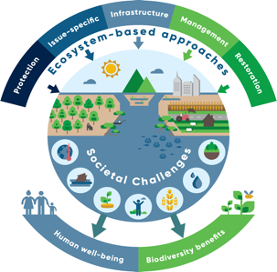
Illustration of ecosystem-based approaches and their benefits
Presenters at the BUS session shared case studies of urban forest as nature-based solutions for tackling the impacts of climate change in their cities, expanding on the unique approaches to urban ecosystem restoration taken by three cities on three different continents. Rik De Vreese, Senior Researcher and Team Leader for Urban Forestry at European Forest Institute and the session’s moderator kicked off the presentations with a call for change. De Vreese asserted that with new societal demands, notably the universal increase in urban populations, the policies and practices for confronting the effects of climate change must change, too.
With that, began three presentations of nature-based models of urban forests by two CLEARING HOUSE case study cities Brussels, Belgium and Guangzhou, China and Belo Horizonte, Brazil, a CLEARING HOUSE Knowledge Exchange Mechanism partner city.
Three nature-based solutions from around the world
Belo Horizonte, Brazil
20% of the city territory of Belo Horizonte in southeastern Brazil is composed of environmentally protected areas. With 70+ municipal parks, 1,000+ springs, and 500,000+ trees in public areas of the city, Belo Horizonte has more than just protected areas for the 5.8 million citizens to enjoy. During his presentation Bernardo Ribeiro, International Relations Director for the Municipality of Belo Horizonte explained that expansions of the protected areas are foreseen and that new approaches to urban forests and nature-based solutions more broadly are being explored.
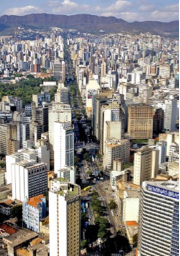
Image of Belo Horizonte’s cityscape and the surrounding terrain.
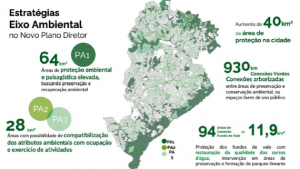
Map of Belo Horizonte’s Green Infrastructure projects across the city
Belo Horizonte’s Green Infrastructure plan will encompass a wide range of projects to bring the natural landscape into the urban area over the course of the coming years. To preserve and recover the local ecosystem, Belo Horizonte’s city government has already protected over 20 kilometers of land in the metropolitan area with another 40 square kilometers of protected area planned in the coming years. Green area connections are next on the docket. The plan for the connections is to create 900+ kilometers of links between the spread out pockets of protected land, which will benefit local animals and citizens alike.
The City of Belo Horizonte aims to expand their nature-based solutions with approaches that integrate urban and rural landscape even further. Some ideas already being implemented include encouraging urban agriculture, universalizing urban afforestation, and developing a green area quality index.
Brussels, Belgium
Environmental Policy Advisor at the European Commission DG ENVIRONMENT Benjamin Casper, shared that the goal of the EU biodiversity strategy is to ensure that by 2030 Europe’s biodiversity will be on a path to recovery and by 2050 there will be clear restoration measures in place for all European ecosystems. One major factor that the European Commission hopes will incentivize agreement is economic impact. The European Commission projects that every euro spent restoration will deliver a return on investment of at least eight euros.
The Brussels Capital Region is ahead of the curve having already started on a path to recovery for the ecosystem in and around Brussels’ capital city. Urban ecology expert at Brussels Environment, Roselyn de Lestrange presented on the integrated strategy Brussels has taken to improve the local climate, biodiversity, and habitability using urban forests, specifically park streets. De Lestrange explained that a park-street strategy uses a network of roads as the base for a multifunctional green infrastructure of tree lines, green facades, planted ditches, draining pavements, and more. This consistently low-tech strategy allows for a high-level of variability in approach and aesthetic, which means it can be easily customized by and for the local community.
Image is a sketch of a park street design
Park street design principles use an ecosystemic approach, meaning they are multifunctional, allow for cross-sectoral involvement, and incorporate the principles of regeneration, reversibility and adaptability to changing context and practices. As a result of the flexibility of the park street design principles, Brussels has been able to host project co-design workshops that have led to a matrix with levels of difficulty and necessity with a grid of nature-based solutions related to water management, biodiversity, landscaping, leisure, food production, mobility, and more.
Guangzhou, China
With a population of 18 million inhabitants, Guangzhou, China, is one of just a few dozen mega cities around the world. Yimin You, Deputy Secretary General at the Guangzhou Foreign Affairs Office, began her presentation by explaining that Guangzhou is located on the Pearl River Delta, an area with high ecological value space; however, due to rapid growth over the last 30 years Guangzhou has seen the encroachment of human-built urban areas on the surrounding nature.
Image of China’s Pearl River Delta in and around the city of Guangzhou
In 2012, the City of Guangzhou started a plan to restore an 11km2 orchard farmland in the center of the city to create a “green heart” now known as the “Haizhu Central Wetland Park” – an oasis of nature between urban areas to integrate urban living with the local ecosystem. Yimin You focused on the first phase of the park known as the “Citizen Participation Area” within which Guangzhou residents can bird watch, tend to the orchard, and pass the day in the rice field.
Yimin You explained that the “Citizen Participation Area,” the first of two construction phases and the only phase complete thus far, was constructed with the goals of creating: a resilient water network with tidal river networks, natural wetlands, and a water purification system; a new home for indigenous birds to nest and live; and, publicly-engaged eco-agriculture for city residents in the form of ecological rice fields, an orchard with year-round harvesting, and a bird-watching trail.
The “Citizen Participation Area” project achieved two-fold success by revitalizing the Pearl River Delta ecosystem and engaging the local community. Each year, hundreds of activities are available to residents at the park and many locals have been hired to care for the park. The wetland park has regulated 50km2 of water logging, cooled down the surrounding urban area by 0.5-1 degree celsius on average, and purified the water to become two grades cleaner than it was previously.
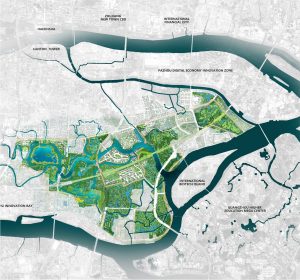
Image of plans for the Haizhu Central Wetland Park in Guangzhou, China
The Brussels Urban Summit
The joint commitment issued by the conference partners at the close of The Brussels Urban Summit 2023 echoed the concerns over the impact of climate change in cities and the belief in investing in nature-based solutions presented during the “Sustaining Cities, Naturally – Urban Ecosystem Restoration through Nature-based Solutions” session. Metropolis along with its conference partners agreed that in order to tackle climate change, one of the biggest challenges to cities, municipalities must back ecosystem restoration efforts in urban areas worldwide.
Metropolis remains committed to promoting a diverse suite of solutions to the challenges of climate change.
Prior to The Summit, Metropolis called on its members to participate in its Seed for Cities initiative, a commitment to plant trees in cities before Metropolis’ 40th anniversary in 2025. Metropolis members have already committed to planting over five million trees.
👉Sign up to stay in touch about our upcoming webinars!
If this article was useful to you, consider attending one of our upcoming webinars this autumn! The webinars will dive deeper into the lessons learned from case studies on urban forests as nature-based solutions to urban ecosystem restoration from across Latin America, Asia, and Europe.
Through the Clearing House project, Metropolis and its partners plan to host the webinar series in November and December 2023 in both English and Mandarin. Each webinar is expected to be optimized for audiences from different sectors, including academics, urban planners, city practitioners, etc.. You can learn more about the webinars by joining our webinar mailing list.
Want to continue reading a bit on the topic?
- Read about IUCN’s work on European Nature-based Solutions on their website.
- Get the latest from the Environment Department European Commission’s by checking their newest plans and reports.
- Learn more about the Guangzhou Wetland project by visiting the Ramsar Sites Information Service Guangdong Guangzhou Haizhu Wetlands project webpage.
Author: Kaitlin Cockerham from Metropolis
Metropolis is the focal point of expertise on metropolitan governance. Raising the voices of metropoles on the global agenda and building capacity to deliver public policies and services, Metropolis contributes to finding common answers to the challenges of metropolisation.
All photo images used in this article are from speaker presentations during the BUS session.
